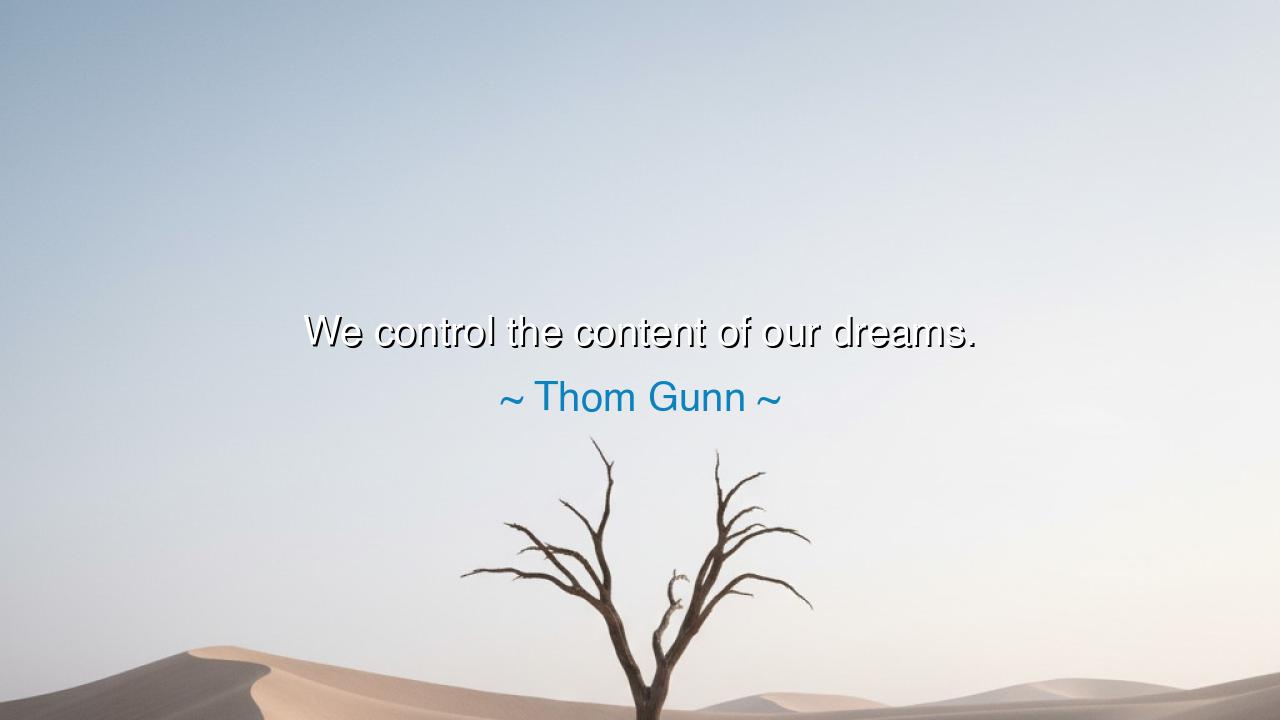
We control the content of our dreams.






In the profound words of Thom Gunn, "We control the content of our dreams," we are invited to consider the powerful agency we hold over the narratives of our unconscious minds. Gunn speaks not merely of literal dreams, those visions that come to us in the stillness of sleep, but also of the deeper, symbolic dreams we carry within us—our hopes, ambitions, and visions for our futures. Dreams, as Gunn suggests, are not passive experiences, subject solely to the whims of our minds; rather, they are shaped by our intentions, our desires, and, most crucially, our will. The content of our dreams can be molded by our conscious choices, by the direction we give to our inner thoughts, fears, and aspirations.
This wisdom is rooted in the teachings of the ancients, who recognized the profound connection between the mind and the self. The philosopher Aristotle, in his reflections on human nature, acknowledged that our dreams were often shaped by our desires and conscious experiences. For Aristotle, the soul was not merely a passive receiver of experiences, but an active participant in shaping the world around it—both consciously and unconsciously. In much the same way, Gunn’s words remind us that we are not slaves to our dreams but have the power to direct them, to influence the direction of our inner world and, ultimately, our external reality.
Consider the life of Leonardo da Vinci, who often spoke of the connection between his waking thoughts and his dreams. His notebooks were filled not only with sketches and technical drawings but with his visions for the future—dreams of inventions, discoveries, and artistic masterpieces. Da Vinci did not wait passively for inspiration to strike; he directed his inner vision, molding his dreams through conscious effort. He believed that, in many ways, his waking thoughts were a continuation of his dreams. For Leonardo, the content of his dreams was not random or dictated by external forces—it was the product of his vision and will. His mastery over his dreams and ideas allowed him to achieve greatness in art and science, creating works that continue to inspire humanity today.
The power of controlling our dreams is not confined to the realm of art and invention. It is also reflected in the lives of those who shape their personal destiny through the dreams they hold and the decisions they make. Mahatma Gandhi, for instance, dreamed of an independent India, free from the chains of colonial rule. This dream, though born in his heart, was not left to the whims of fate. Gandhi worked tirelessly, with deep conviction and purpose, to turn this dream into a reality. He controlled the content of his vision by channeling it into action, using nonviolence, truth, and peaceful resistance to create the India he had long imagined. His ability to shape his dream and steer it toward a clear objective illustrates the power of taking conscious control over the content of our aspirations.
Yet, the ability to control the content of our dreams is not without challenge. Dreams are often shaped by external forces—by society, by the people around us, and by our past experiences. It can be easy to feel that our dreams are pre-determined, that they are subject to the limitations imposed by the world. However, the true lesson of Thom Gunn’s words is that, while external influences will always play a role, we ultimately have the power to choose the direction of our dreams. Whether it is through the lens of personal growth, societal change, or artistic expression, we hold the agency to shape the content of our dreams and, by extension, our lives.
The lesson to be learned here is one of empowerment: we are not mere spectators in the unfolding of our lives. We are active participants, capable of influencing the narratives of our dreams. To control the content of our dreams is to take responsibility for our own future, to shape our reality by the thoughts we choose to cultivate, the actions we take, and the aspirations we pursue. It is not enough to passively dream—action is the key to realizing those dreams. Through reflection and intention, we can direct the course of our lives, just as artists, philosophers, and leaders throughout history have done.
To take practical action in our lives, we must begin by defining our dreams with clarity and purpose. We must not only dream, but actively engage with those dreams by breaking them down into achievable goals and concrete actions. We can use journals, vision boards, or simply the practice of meditation to align our conscious and unconscious selves. By consistently reflecting on our dreams and reaffirming our commitment to them, we shape the content of our future. As Gunn reminds us, it is through this deliberate action—guided by our deepest intentions—that we create lives that are not defined by chance or circumstance, but by the dreams we choose to shape and the effort we put into realizing them.






AAdministratorAdministrator
Welcome, honored guests. Please leave a comment, we will respond soon